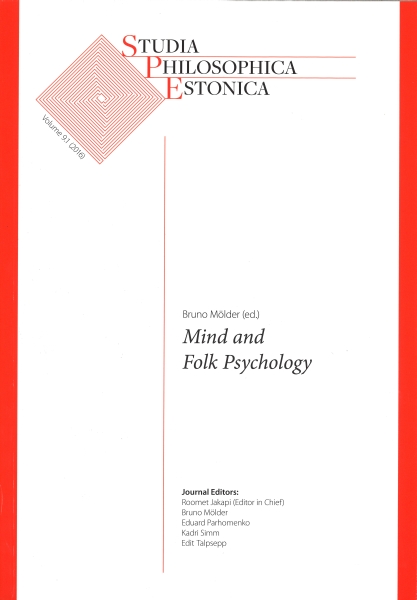Mind and Folk Psychology: A Partial Introduction
DOI:
https://doi.org/10.12697/spe.2016.9.1.01References
Andrews, K. (2012). Do Apes Read Minds? Toward a New Folk Psychology, The MIT Press, Cambridge, MA.
Andrews, K. (2015). The folk psychological spiral: Explanation, regulation, and language, The Southern Journal of Philosophy 53: 50-67.
Arminjon, M. (2013). Is psychoanalysis a folk psychology?, Frontiers in Psychology 4: 1-9.
Bermudez, J. L. (2003). The domain of folk psychology, in A. O'Hear (ed.), Minds and Persons, Royal Institute of Philosophy Supplements (Book 53), Cambridge University Press, pp. 25-48.
Bermudez, J. L. (2005). Philosophy of Psychology, Routledge, London.
Braaten, J. (1988). Elimination, enlightenment and the normative content of folk psychology, Journal for the Theory of Social Behaviour 18: 251-268.
Churchland, P. M. (1979). Scientific Realism and the Plasticity of Mind, Cambridge University Press, Cambridge.
Churchland, P. M. (1981). Eliminative materialism and the propositional attitudes, Journal of Philosophy 78: 67-90.
Churchland, P. M. (1994). Folk psychology (2), in S. Guttenplan (ed.), A Companion to the Philosophy of Mind, Blackwell, Oxford, pp. 308-316.
Clark, A. & Chalmers, D. (1998). The extended mind, Analysis 58: 7-19.
Dainton, B. (2006). Stream of Consciousness: Unity and Continuity in Conscious Experience, 2nd edn, Routledge, London.
Dennett, D. C. (1969). Content and Consciousness, Routledge, London.
Dennett, D. C. (1981). Three kinds of intentional psychology, in R. Healey (ed.), Reduction, Time and Reality, Cambridge University Press, Cambridge, pp. 37-61.
Dennett, D. C. (1987). The Intentional Stance, The MIT Press, Cambridge, MA.
Dennett, D. C. (1991). Consciousness Explained, Little, Brown & Co, Boston.
Dennett, D. C. (2013). Intuition Pumps and Other Tools for Thinking, W. W. Norton & Co, New York.
Dreyfus, H. & Kelly, S. (2007). Heterophenomenology: Heavy-handed sleight-of-hand, Phenomenology and the Cognitive Sciences 6: 45-55.
Gallagher, S. (2001). The practice of mind: Theory, simulation, or interaction?, Journal of Consciousness Studies 8: 83-107.
Gallagher, S. (2008a). Direct perception in the intersubjective context, Consciousness and Cognition 17: 535-543.
Gallagher, S. (2008b). Inference or interaction? Social cognition without precursors, Philosophical Explorations 11: 163-174.
Gallese, V. (2001). The `Shared Manifold' hypothesis: From mirror neurons to empathy, Journal of Consciousness Studies 8: 33-50.
Gauker, C. (2003). Words without Meaning, The MIT Press, Cambridge, MA.
Gendler, T. (2008). Alief in action (and reaction), Mind & Language 23: 552-585.
Godfrey-Smith, P. (2004). On folk psychology and mental representation, in H. Clapin, P. Staines & P. Slezak (eds), Representation in Mind: New Approaches to Mental Representation, Elsevier, Oxford, pp. 147-162.
Goldman, A. (1993). The psychology of folk psychology, Behavioral and Brain Sciences 16: 15-28.
Goldman, A. (2000). Folk psychology and mental concepts, Protosociology 14: 4-25.
Goldman, A. (2008). Simulating Minds: The Philosophy, Psychology, and Neuroscience of Mindreading, Oxford University Press, Oxford.
Husserl, E. (1991). On the Phenomenology of the Consciousness of Internal Time, Kluwer, Dordrecht. Edited and translated by J. B. Brough.
Hutto, D. (2008). Folk Psychological Narratives: The Sociocultural Basis of Understanding Reasons, The MIT Press, Cambridge, MA.
Hutto, D. D. (2009a). Folk psychology as narrative practice, in D. D. Hutto (ed.), Narrative and Folk Psychology, Imprint Academic, Exeter, pp. 9-39.
Hutto, D. D. (2009b). Lessons from Wittgenstein: Elucidating folk psychology, New Ideas in Psychology 27: 197-212.
Krueger, J. (2013). Merleau-Ponty on shared emotions and the joint ownership thesis, Continental Philosophy Review 46: 509-531.
Lewis, D. K. (1972). Psychophysical and theoretical identifications, Australasian Journal of Philosophy 50: 249-258.
Lurz, R. & Krachun, C. (2011). How could we know whether nonhuman primates understand other's internal goals and intentions? Solving Povinelli's problem, Review of Philosophy and Psychology 2: 449-481.
Lycan, W. (1997). Folk psychology and its liabilities, in M. Carrier & P. K. Machamer (eds), Mindscapes: Philosophy, Science, and the Mind, University of Pittsburgh Press, Pittsburgh, pp. 1-21.
McGeer, V. (2007). The regulative dimension of folk psychology, in D. D. Hutto & M. Ratcliffe (eds), Folk Psychology Re-Assessed, Springer, Dordrecht, pp. 137-156.
Millikan, R. (1996). Pushmi-pullyu representations, in J. Tomberlin (ed.), Philosophical Perspectives, Vol. 9, Ridgeview Publishing, Atascadero, CA, pp. 185-200.
Morton, A. (2003). The Importance of Being Understood: Folk Psychology as Ethics, Routledge, London.
Nichols, S. & Stich, S. P. (2003). Mindreading: An Integrated Account of Pretence, Self-Awareness, and Understanding Other Minds, Clarendon Press, Oxford.
Ratcliffe, M. (2007). Rethinking Commonsense Psychology: A Critique of Folk Psychology, Theory of Mind and Simulation, Palgrave Macmillan, Basingstoke.
Sellars, W. (1956). Empiricism and the philosophy of mind, in H. Feigl & M. Scriven (eds), Minnesota Studies in the Philosophy of Science, Volume I: The Foundations of Science and the Concepts of Psychology and Psychoanalysis, University of Minnesota Press, Minnesota, pp. 253-329.
Steward, H. (1997). The Ontology of Mind: Events, Processes and States, Clarendon Press, Oxford.
Stich, S. P. (1983). From Folk Psychology to Cognitive Science: The Case Against Belief, The MIT Press, Cambridge, MA.
Stich, S. P. (1996). Deconstructing the Mind, Oxford University Press, Oxford.
Trevarthen, C. (1979). Communication and cooperation in early infancy. A description of primary intersubjectivity, in M. Bullowa (ed.), Before Speech: The Beginning of Human Communication, Cambridge University Press, Cambridge, pp. 321-347.
Von Eckhardt, B. (1994). Folk psychology (1), in S. Guttenplan (ed.), A Companion to the Philosophy of Mind, Blackwell, Oxford, pp. 300-307.
Wilkes, K. (1991). The relationship between scientific psychology and common-sense psychology, Synthese 89: 15-39.
Zawidzki, T. W. (2013). Mindshaping: A New Framework for Understanding Human Social Cognition, The MIT Press, Cambridge, MA.





